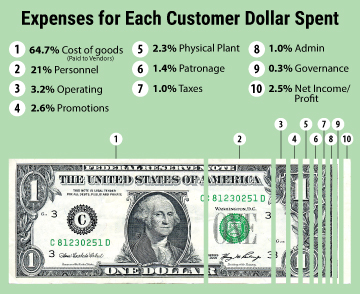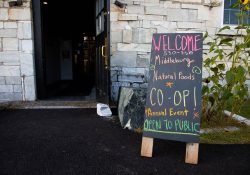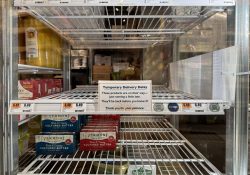
A Fine Balance
I have had the pleasure of serving as the Middlebury Natural Food Co-op (Co-op) Board Treasurer for the past four years. For me, this time of year always includes working with Glenn Lower (GM) and Steve Koch (Finance Manager) to develop the annual budget for the next fiscal year. The Co-op is no longer a buying club nor a mom & pop operation. It is a robust and thriving food cooperative that employs 115 staff members and serves 5,500 member-owners. I mention this because our Co-op has grown and evolved in the past 40 years into a complex organization.
Building an annual budget is a bit like putting a puzzle together. In the case of the Co-op, the process starts with projecting annual sales for the next fiscal year. Think of annual sales as the frame, or border, of the puzzle and the remaining puzzle pieces as all the competing needs and priorities that must be considered, sorted by color to make up the interior of the puzzle. Believe it or not, there is an art to building a realistic and financially sustainable budget! It requires looking at past performance, current trends, and imagining a desired future state.
The Co-op’s annual budget process is guided and informed by our Mission and End Statements:
Mission Statement:
The Middlebury Natural Foods Cooperative is a democratic, member-owned cooperative committed to providing healthy, competitively priced foods; encouraging ecologically sound and healthful patterns of production and consumption; and responding to members’ needs accordingly.
Ends Statement:
Our cooperative exists so that Co-op member-owners, customers, and the community benefit from:
- Healthy Foods
- Vibrant Local Economy
- Environmentally Sustainable and Energy Efficient Practices
- Co-operative Democratic Ownership
- Learning About These Values
The “Ends” guide day-to-day operations, inform decision making and serve as a constant reminder of the purpose of our cooperative. The Ends represent our cooperative values. As you can imagine, there are many competing priorities to consider and balance as we create a budget that aligns with our mission and values and is financially sustainable.
The Co-op strives to provide the fairest possible prices to customers and at the same time provide fair compensation to employees and fair prices to farmers/producers. During the past year, there has been a lot of discussion about the minimum wage on a local, state, and national level. The Co-op has followed this public conversation and recently committed to bringing the lowest-paid positions up to $15/hour by March 31, 2021. This decision was made thoughtfully and took into consideration the current and long-term impact on the budget. This is one example of the thought and consideration that goes into building a budget that reflects the Co-op’s commitment to staff and a vibrant local economy.
I will close with a simple graphic depiction that Glenn often shares at the annual meeting. Imagine $1 in sales and how it is sliced up by big expense categories.
As you can see, 65 cents of every dollar go toward paying fair prices to farmers/ producers and 22 cents provides fair compensation (wages & benefits) to employees. The remaining 11-12 cents cover other operating expenses (administration, physical plant, promotions, governance, taxes, loan interest, Patronage dividend) leaving a small net profit (1-2 cents of each dollar). The net profit is saved for reinvesting in the future community co-op.
Managing and operating within a financially sustainable budget is a bit like walking a tight rope. It requires focus, foresight, and commitment to balancing all the demands of running a business while embracing our Co-op mission and values.
Lynn Dunton is a Middlebury Natural Foods Co-op Board Member






